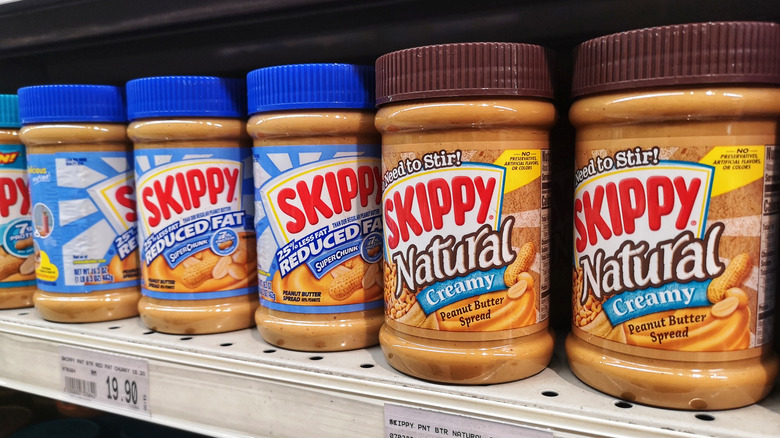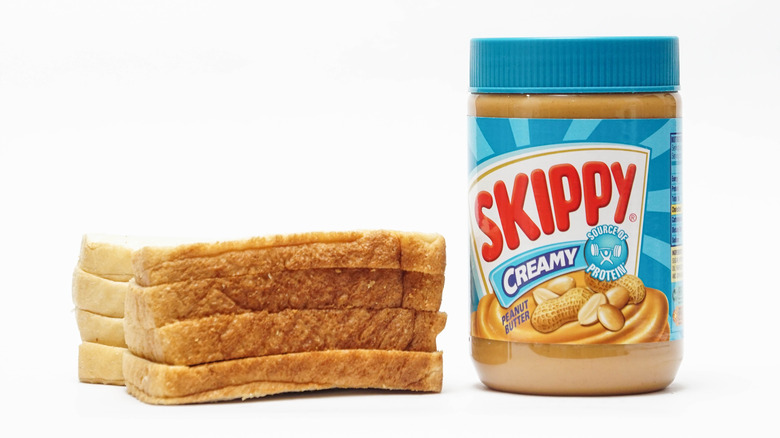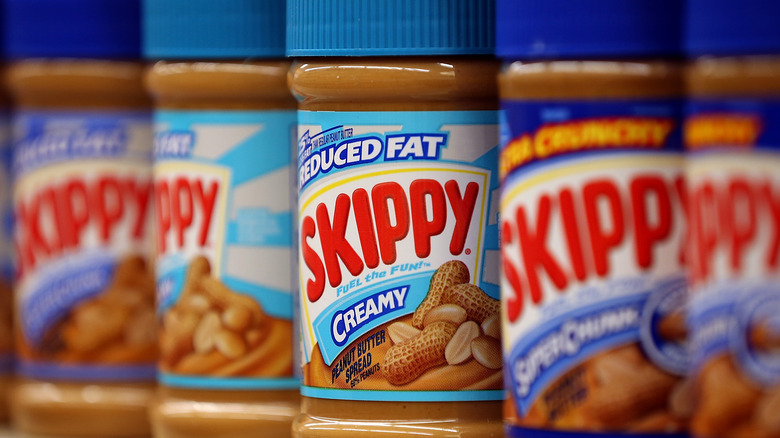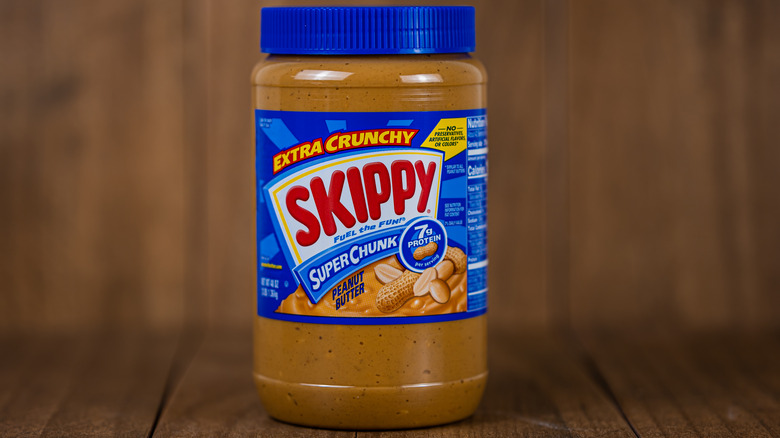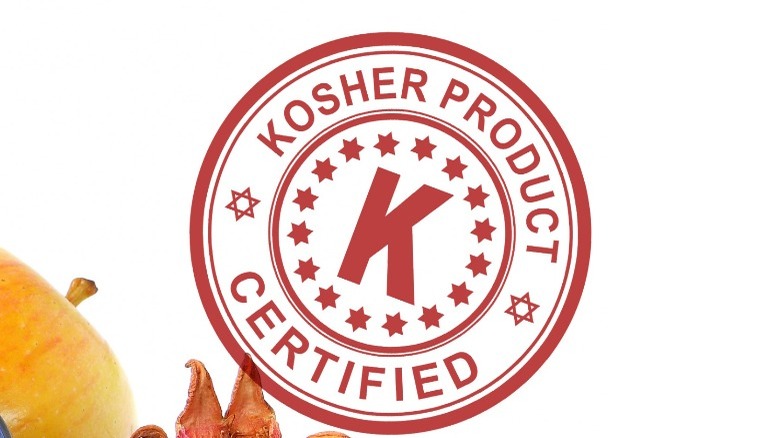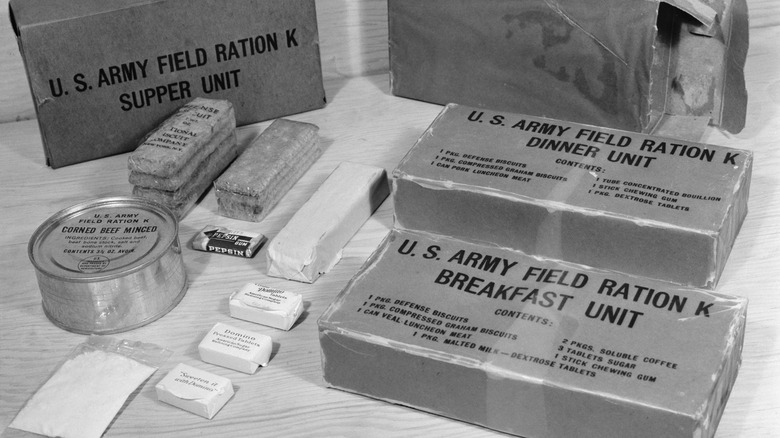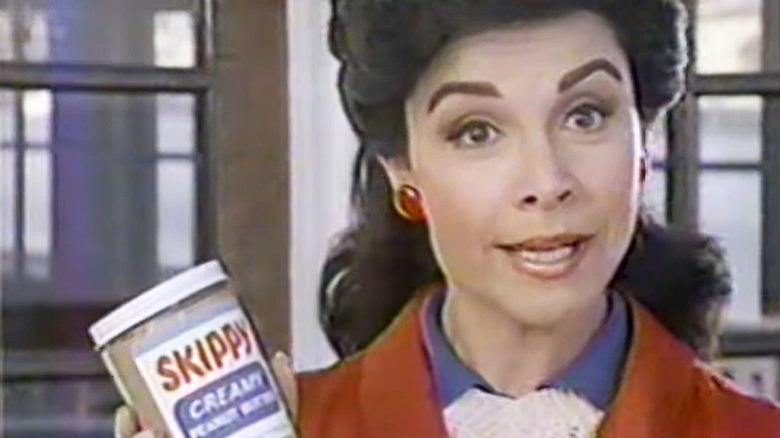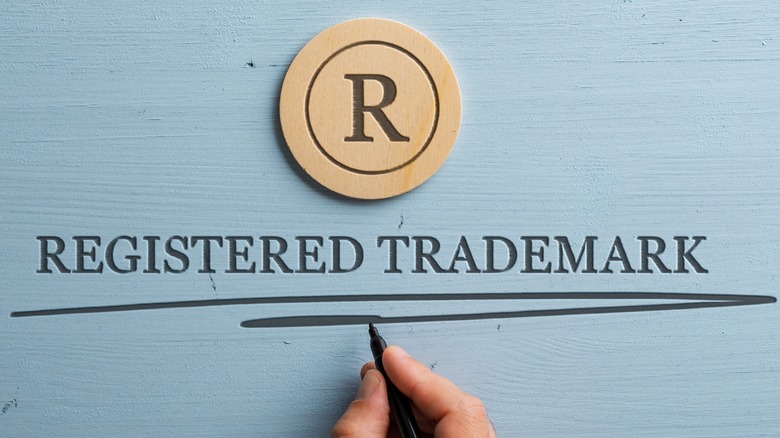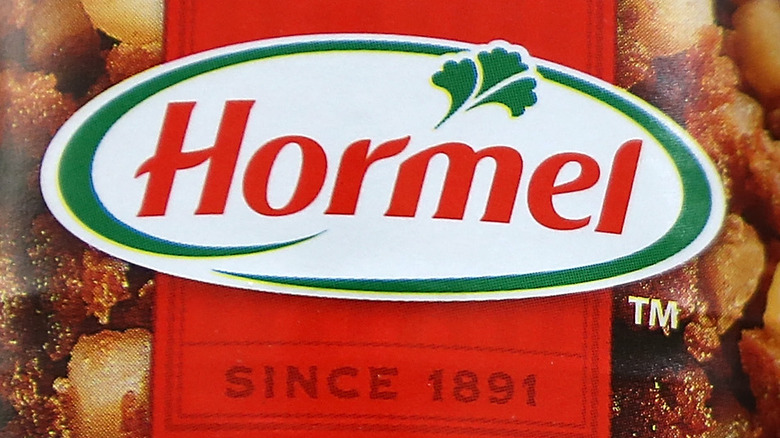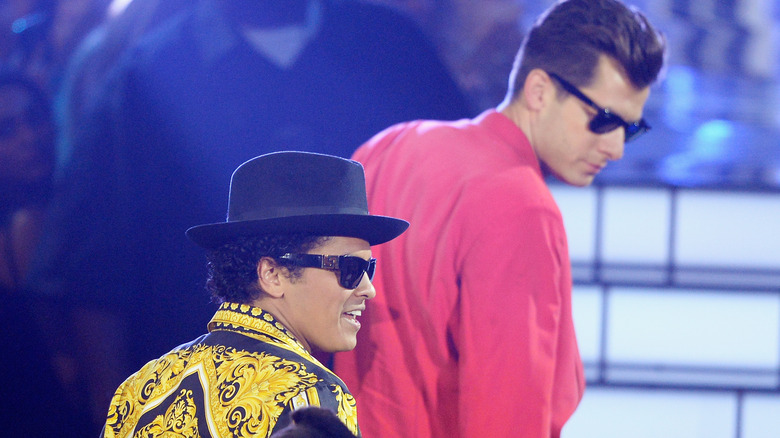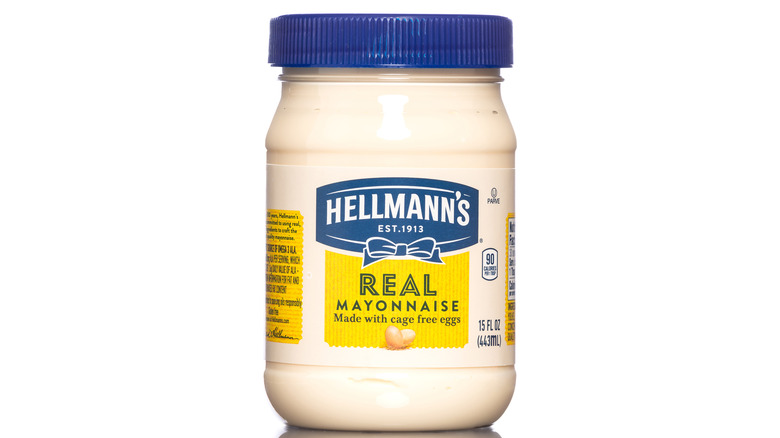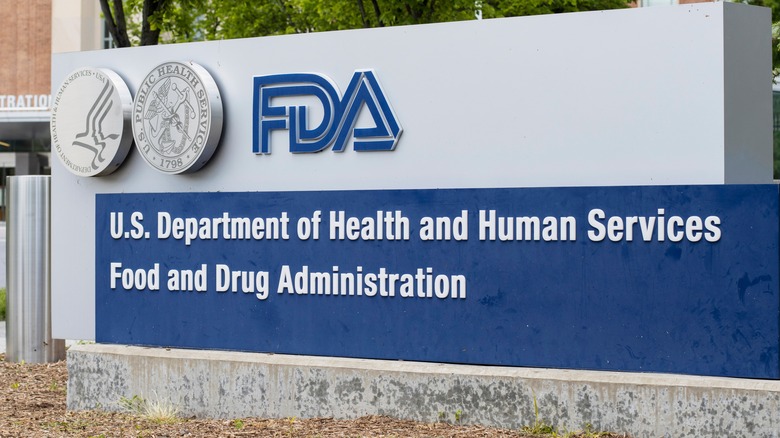Skippy Peanut Butter: The Story Behind The Lunchbox Staple
Forgive us for channeling our inner Chris Traeger (Rob Lowe) for a moment, but peanut butter is ... literally ... the greatest food in the entire history of humanity. We're only sort of joking, by the way. Frankly, even attempting to name a better, more diverse food item is a truly trying task. Whether in a peanut butter and jelly sandwich, a chocolate-wrapped Reese's, or simply eaten straight from the jar (this writer's preference), peanut butter is a top drawer food item — even if most of us store it in the pantry.
The spreadable, perfectly sweet-and-salty product is everywhere throughout the U.S., in countless forms and brands. It's such a ubiquitous item that, according to Smithsonian, the average American child will have downed 1,500 PB&Js by the end of high school. But whether you prefer a "just peanuts" variety or a texturally-sound crunchy version, only one brand can genuinely claim to be as slick, stylish, and smooth as a dressed-to-the-nines Bruno Mars: Skippy peanut butter.
Even without the undeniably cool "Uptown Funk" namedrop, though, Skippy has earned its place in the peanut butter pantheon. With nearly 90 years in business as of 2022 (via Hormel), there's no shortage of reasons for Skippy's enduring popularity. For the curious consumer, we've gathered some of the more interesting facts about the brand, and gladly present the story behind the classic childhood lunchbox staple, Skippy.
Skippy was created by the same man who invented modern peanut butter
When most people think about peanut butter, they likely picture a smooth, creamy product. In other words, modern consumers reaching for a jar of Skippy or Jif don't expect to see a layer of oil atop a gritty amalgamation of peanuts. But if you're averse to those relatively unprocessed, "just nuts" varieties, you can thank Skippy founder, Joseph Rosefield. After all, he was responsible for creating the hydrogenated form of silky-smooth peanut butter that now dominates the market (via Smithsonian).
Now, to be clear, Rosefield didn't invent peanut butter. After all, the food had first been developed in the late 19th century, as a protein-rich item for sanitarium patients that didn't require much chewing. In fact, peanut butter had already become somewhat of a staple in U.S. households by the 1920s. But Rosefield's partial hydrogenation process — which turned the normally-liquid oil in peanut butter into a semisolid, eliminating potential separation once the product was blended – opened the doors to a much longer-lasting, and more shelf-stable, product than previously available.
Rosefield's hydrogenated peanut butter found immediate success with customers. By 1942, hydrogenated peanut butter brands outsold natural varieties for the first time, according to The New Yorker, and, as of 2012, more than 80% of peanut butter in U.S. stores was hydrogenated.
The name may have been stolen from a popular comic strip
Companies have never been shy about co-opting already famous names for their products. But as is the utterly ruthless nature of capitalism, a company may not be entirely forthright with that inspiration one way or another — think Baby Ruth claiming it wasn't named after Babe Ruth. Even if speculation runs rampant, the public may never receive a straight answer. After all, while many believed Joseph Rosefield took Skippy peanut butter's name from the popular comic strip, "Skippy" (via Time), he never seemed to acknowledge the controversy one way or another.
"Skippy" (the comic) had been created by Percy Crosby in the 1920s, so the trademark to the name was unavailable when Rosefield founded his peanut butter company the following decade (via Foley Hoag LLP). But while Rosefield was unable to patent the name, he still marketed his new peanut butter brand under the Skippy name without objection from Crosby. When Crosby eventually let his trademark on the Skippy name expire in the late 1940s, Rosefield swooped in, and officially obtained the trademark to Skippy in 1947.
Frankly, whether or not Rosefield straight-up stole the Skippy name from the Crosby comic in unclear. But considering the comic's popularity at the time, which included a film adaption (co-written by Crosby) released in 1931, it's hard to believe the peanut butter brand's overlapping name was entirely accidental.
It's one of the most popular peanut butter brands in the U.S.
When it comes to the story of Skippy peanut butter, its widespread popularity may be the most obvious aspect surrounding it. After all, certain industries in the U.S. are dominated by a select few companies — and the peanut butter market is one of them. Skippy may not have topped Jif in sales in 2017 among peanut butter brands, according to Statista, but it did best Peter Pan that year as the second best-selling peanut butter brand in the U.S.
Realistically, it's difficult imagining a scenario where Skippy, Jif, and Peter Pan aren't the three best-selling peanut butter brands in the country, though. Akin to the three-way grasp Burger King, McDonald's, and Wendy's have on the fast food burger industry, no other brand has the nationwide profile of those three peanut butter giants.
A better profile of Skippy's popularity may be demonstrated in a 2020 survey (via Statista), in which 60 million Americans reported eating at least one jar of Skippy during the previous month. In other words, people aren't just buying Skippy and leaving it in the cabinet — they're rushing home to devour it.
Skippy was the first brand to sell crunchy peanut butter
Skippy peanut butter has been primed for innovation since its inception. After all, it was founded by Joseph Rosefield, who devised the method for producing hydrogenated, non-oil-separated peanut butter (via Smithsonian). But the man who developed the partial hydrogenation process for peanut butter production didn't stop there. In fact, at some point during the 1930s, he and Skippy became the first company to both make and sell crunchy peanut butter.
It's uncertain whether or not crunchy (or chunky) peanut butter was available from day one at Skippy. But befitting the creative mind behind its founding, Rosefield's experimentation with adding actual peanut pieces to the final, initially-smooth product allowed Skippy to set the crunchy peanut butter trend (via New Yorker).
Crunchy peanut butter may not be for everyone. But for those folks who find the traditional, creamy style of peanut butter a bit texturally boring, Skippy's decision to introduce crunchy peanut butter to consumers is one to applaud. And, frankly, it's just one more reason why Skippy has earned its place as an American institution.
Most of its peanut butter products are kosher-certified
Quite frankly, determining the precise number of U.S. citizens who adhere to a kosher diet is impossible. After all, while a 2020 Pew Research Center report estimated 5.8 million American adults were Jewish, not every person of the Jewish faith follows the religion's dietary laws. Perhaps, then, that lack of hard data (regarding the potential profits for kosher products) just makes it more impressive when a company chooses to ensure its products meet that rigorous standard — as Skippy does, according to its website.
Skippy proudly proclaims the vast majority of its products — excluding its P.B. Bites snack line — are certified kosher by OU, or the Orthodox Union. While there's little other information available regarding its kosher certification process, there's no real reason to think the international brand would risk its reputation by falsely portraying itself as religiously inclusive.
Interestingly, though, while peanut butter itself is generally considered kosher, some Ashkenazi Jewish individuals won't eat it during Passover, believing legumes (and, therefore, peanuts) are prohibited during the holiday (via Chicago Jewish News).
Tins of Skippy were included in soldiers' rations during World War II
For a food brand that's been around since before FDR was president, it's easy to imagine Skippy peanut butter playing a hand in U.S. history. Indeed, within a decade of Joseph Rosefield launching his hydrogenated peanut butter brand, Skippy was helping America's "Greatest Generation" survive the second World War — at least, those Americans living or stationed outside the continental U.S. (via Smithsonian).
The high level of shelf stability found in Rosefield's hydrogenated peanut butter (and peanut butter's relatively cheap cost) made it ideal for inclusion in soldiers' rations. Consequently, tins of Skippy peanut butter became a common addition among the food items given to deployed troops. Along with Skippy tins, World War II rations commonly included jelly and sliced bread, as well (via National Peanut Board), providing the building blocks for a nutritious, quickly-assembled, and easily-eaten peanut butter and jelly sandwich.
Additionally, according to the Historical Marker Database, Rosefield Packing, the company that produced the Skippy brand, didn't just provide peanut butter for soldiers overseas. It also sent emergency shipments of peanut butter to Hawaii residents during the war, as well.
Annette Funicello starred in a series of commercials for the brand in the 1980s
Annette Funicello was a bonafide American treasure. One of the original Mouseketeers, the legendary performer truly was "America's sweetheart," as her long-time co-star, Frankie Avalon, told the Los Angeles Times in 2013. A better example of the All-American girl may not exist, quite frankly ... which is probably why Skippy hired Funicello for a series of commercials in the 1970s and '80s (via Ad Age).
Beginning in 1979, according to Today, Funicello appeared in numerous advertisements for Skippy through the '80s, proudly proclaiming "it's hard to beat Skippy" in each appearance. The commercials commonly featured Funicello popping up at random social events, extolling the virtues of Skippy peanut butter to the folks nearby. A quarter century removed from her Mickey Mouse Club days, the still-beloved American icon appeared in at least nine different commercials for the peanut butter brand.
If nothing else, the series of commercials seemed to lead to a mini-career renaissance of sorts for Funicello during the '80s. But after a devastating multiple sclerosis diagnosis ended her on-screen career in the early '90s, her health slowly declined. And, in 2013, she passed away due to complications from the debilitating disease at age 70.
The battle over the Skippy name continued into the 21st century
Coming up with a genuine defense of Joseph Rosefield's decision to name his peanut butter brand Skippy is tricky. At least, it is if you're aiming to dispute the notion he intentionally ripped off the immensely-popular comic strip, "Skippy," with the name. Now, it's true that Rosefield legally obtained the trademark to Skippy in 1947 after "Skippy" creator, Percy Crosby, let his own trademark expire (via Foley Hoag LLP). But according to Crosby's daughter, Joan Crosby Tibbetts, the situation is much less cut-and-dry than that.
Crosby Tibbetts waged legal warfare against the peanut butter brand for decades over the rights to the Skippy name. Though a 1978 financial settlement between Crosby Tibbetts and Skippy's then-parent company, Bestfoods Inc., temporarily paused the acrimony between parties (via Associated Press), the battle didn't stop there. Crosby Tibbetts continued her pursuit through the legal system until 2004, in fact, when the Supreme Court denied her final request to file suit against Skippy over the name.
While Crosby Tibbetts never did earn the legal victory she sought in her father's memory, she refused to go quietly into the night. She continued to plead her case to the public on her website, never relinquishing until her death at age 87 in 2019 (via The Daily Cartoonist).
The brand was purchased by Hormel Foods in 2013
To be perfectly honest, when we think of Hormel Foods, our mind immediately gravitates towards canned chili and canned corned beef. Perhaps we're being a bit unkind to the food brand conglomerate, though. Because while we may not automatically lump Hormel in with Kraft-Heinz or General Mills, there's a fairly significant cache of brands under its corporate umbrella, including Spam, Planters, Jennie-O — and Skippy peanut butter.
Hormel Foods acquired the widely popular — and internationally-sold — peanut butter brand for a whopping $700 million dollars in 2013 (via SEC). Naturally, since Skippy's approximate annual sales totaled $370 million dollars at the time, Hormel appeared to take an if-it-ain't-broke approach to its newly-purchased brand. After all, have you noticed anything different in the taste and presentation of Skippy peanut butter since the sale?
One particularly interesting aspect of Hormel's 2013 purchase of Skippy was the initial exclusion of China in its global acquisition deal (via Food Dive). However, according to Hormel, the company was able to finalize a deal for the Chinese production of Skippy in November 2014, completing its global takeover of the peanut butter brand.
A Be Smooth Like Skippy slogan was inspired by 'Uptown Funk'
To say pop culture enthusiasts mainly associate Skippy peanut butter with Bruno Mars, Mark Ronson, and the massive 2014 hit, "Uptown Funk" in 2022 isn't much of a stretch. But who can blame anyone unable to separate the delicious peanut butter brand from its undeniably cool mention in the hit pop song? Not Skippy itself, apparently, which licensed the song for a 2018 ad campaign titled Be Smooth Like Skippy (via PRNewswire).
Featuring the song in a series of 15 and 30-second commercials, the Be Smooth Like Skippy promotion showcased the brand's traditional peanut butter products, as well as the then-new P.B. Bites snack line. As Skippy brand manager, Jennesa Kinscher, said in the press release (via PRNewswire), the campaign allowed the brand to show off its "fun, light hearted personality" while ensuring it drove home "how smooth and craveable Skippy peanut butter is."
Since "Uptown Funk" wasn't exactly new by 2018, there were some concerns regarding the ad campaign's continued relevance (via Marketing Dive). But considering the song was, quite literally, the song of the decade for the 2010s, according to Billboard (and still makes us bob our heads anytime we hear it in 2022), it's unlikely Skippy has any regrets.
Some 1960s advertisements encouraged consumers to pair Skippy with mayonnaise
Perhaps because this writer was raised north of the Mason-Dixon line, it's still a struggle to fully comprehend the logic (or appeal) behind a peanut butter and mayonnaise sandwich. Sure, many folks believe it's one of the best things to add to a peanut butter sandwich besides jelly. But having never mustered the courage to actually taste one, defaulting to Skippy's stance on the matter might be the best policy. After all, according to a series of print advertisements released in the 1960s, Skippy peanut butter and Hellmann's mayonnaise (or Best Foods, depending on the area of the country) were declared to be "together tremendous" (via Weird Universe).
After Bestfoods Inc. acquired Skippy in 1955, the company was eager to boost sales for both its new brand, and its popular Hellmann's and Best Foods mayo brands (via Peanut Butter Pleasure). The result was a synergistic ad campaign pushing the two popular food spreads as natural sandwich companions, complete with several different recipe options to try.
If we're being honest, the almost aggressive lack of texture found between peanut butter and mayonnaise is likely the biggest turnoff for some when it comes to the combination. But the early '60s advertisements included several suggested recipes beyond the "lunchbox special" — i.e. just PB and mayo — offering ways for consumers to dip their toes into the peanut butter and mayo waters before diving right in.
Skippy had to issue product recalls in 2015 and 2022
There's a certain trust consumers have regarding a food product's safety. If that trust is broken, putting the pieces back together can be enormously difficult — no matter the brand or company. Even Skippy isn't immune to public second-guessing. After all, while we'd like to give it the benefit of the doubt for its voluntary recall in 2022 — when jars were suspected of containing, ahem, small metal fragments (via FDA) — well, it's tough to do considering the exact same thing caused a recall in 2015, as well (via Hormel).
If you feel like you're watching (another) ripoff of "Groundhog Day," where the same day and events are repeated on an endless loop, you're not alone. Somehow, only seven years removed from issuing a seven-state recall after metal shavings were discovered on the production line for its peanut butter (via New York Times), Skippy was forced to issue another recall in 2022 for the remarkably similar issue.
To state the obvious, food recalls are never a good look for a company. But to be fair to Hormel, if nothing else, both the 2015 and 2022 recalls were issued voluntarily, rather than being mandated by the FDA. Additionally, since we weren't able to find any evidence of any injuries or illness from either recall, we're still apt to purchase Skippy. After all, we love its crunchy peanut butter — we just prefer that the crunch comes from peanuts, not metal bits.
